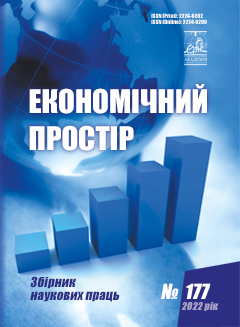CHINA'S FOREIGN TRADE IN THE CONDITION OF FOREIGN ECONOMIC OPENNESS POLICY: FACTORS AND CONSEQUENCES
Abstract
The article examines the factors and consequences of China's foreign trade in terms of foreign economic openness. It is substantiated that the implementation of the policy of foreign economic openness involves the transfer of the center of gravity from trade in goods to trade in services, closer ties of foreign economic activity with scientific and technological innovations, improving the protection of intellectual property. At the same time, the process of transforming the model of economic growth in China means shifting the attention of government agencies to investment and exports, which previously occupied a leading position, to domestic consumption and innovation. The main factors that contributed to China's gradual rise to the position of "world factory" and its status as a world leader in foreign trade were cheap labor, providing broad benefits to foreign capital, gradually reducing tariff tariffs and easing non-tariff bars for goods from China on the world market after its accession to the WTO, the development of production and export of constantly updated and increasingly technically complex range of products, as well as the rapid increase in the number of foreign economic relations. It is concluded that, although the country faces the prospect of deteriorating external conditions for foreign economic activity, including the West's negative attitude to the "Made in China - 2025" program and the US-China trade confrontation, China is working on a strategy for further foreign economic development connections. The need to accelerate the transition to new factors in the development of foreign trade and improve its structure, create new comparative advantages in international competitiveness, the transition from rapid growth to quality growth is declared. To do this, the implementation of the course for "five improvements" or optimizations, which includes: the formation of a wider network of trading partners; improving the territorial distribution of foreign trade and investment activities in China itself; technical, institutional, managerial renewal of enterprises - subjects of foreign economic relations; optimization of the commodity structure of trade, development of products with high added value; improving existing and finding new ways of conducting trade, comprehensive development of trade in services and goods.
References
Dovgal O., Goncharenko N., Honcharenko V., Shuba T., Babenko V. Leadership of China in the innovative development of the BRICS countries. Journal of Advanced Research in Law and Economics. 2019. № 10(8). Р. 23052316. DOI: https://doi.org/10.14505/jarle.v10.8(46).09 (дата звернення: 7.09.2021).
Hanemann T., Huotari M. EU– China FDI: Working towards Reciprocity in Investment Relations. MERICS. Mercator Institute for China Studies. Berlin, May 2018. URL: https://www.merics.org/en/papers-onchina/reciprocity (дата звернення: 11.10.2021).
Investing in China’s Free Trade Zones. China Briefing, September 21, 2017. URL: https://www.china-briefing.com/news/investing-in-chinas-free-trade-zones/ (дата звернення: 5.10.2021).
Kroeber A., Wang D. The Export Upgrade Challenge. China Economic Quarterly. 2019. Vol. 21. № 2. P. 37–47.
Lemoine F., Unal D. China’s Foreign Trade: A “New Normal”. China & World Economy. 2020. Vol. 25. № 2. P. 1–21.
Miller T. The Belt and Road to Leadership. China Economic Quarterly. 2018. Vol. 21. № 2. P. 9–16.
Miller T., Kratz A. Open Check-book, Closed Market. China Economic Quarterly. 2017. Vol. 20. № 3. P. 37–43.
MOFCOM. Releases the Report on China's Foreign Trade Situations (Spring 2021). China Justice Observer. Department of General Affairs of the Ministry of Commerce and Chinese Academy of International Trade and Economic Cooperation, 2021. URL: https://www.chinajusticeobserver.com/a/mofcom-releases-the-report-on-china-s-foreign-trade-situations-spring-2021 (дата звернення: 12.10.2021)
World Trade Organization – Trade Profiles 2020. URL: https://www.wto.org/english/res_e/statis_e/daily_update_e/trade_profiles/CN_e.pdf (дата звернення: 24.10.2021).
Zenglein Max J., Holzmann A. Evolving Made in China 2025: China’s industrial policy in the quest for global tech leadership. MERICS. Mercator Institute for China Studies. Berlin, Jul 02, 2019. URL: https://merics.org/en/report/evolving-made-china-2025 (дата звернення: 20.10.2021)
Dovgal, O., Goncharenko, N., Honcharenko, V., Shuba, T., Babenko, V. (2019). Leadership of China in the innovative development of the BRICS countries. Journal of Advanced Research in Law and Economics, 10 (8), pp. 2305–2316. DOI: https://doi.org/10.14505/jarle.v10.8(46).09 (accessed 7.09.2021).
Hanemann, T., Huotari, M. (2018) EU– China FDI: Working towards Reciprocity in Investment Relations. MERICS. Mercator Institute for China Studies. Berlin, May. URL: https://www.merics.org/en/papers-onchina/reciprocity (accessed 11.10.2021).
Investing in China’s Free Trade Zones (2017). China Briefing, September 21, 2017. URL: https://www.china-briefing.com/news/investing-in-chinas-free-trade-zones/ (accessed 5.10.2021).
Kroeber, A., Wang, D. (2019). The Export Upgrade Challenge. China Economic Quarterly, Vol. 21, No 2, Pp. 37–47.
Lemoine, F., Unal, D. (2020). China’s Foreign Trade: A “New Normal”. China & World Economy, Vol. 25, No 2, Pp. 1–21.
Miller, T. (2018). The Belt and Road to Leadership. China Economic Quarterly, Vol. 21, No 2, Pp. 9–16.
Miller, T., Kratz, A. (2017). Open Check-book, Closed Market. China Economic Quarterly, Vol. 20, No 3, Pp. 37–43.
MOFCOM. Releases the Report on China's Foreign Trade Situations (Spring 2021). China Justice Observer / Department of General Affairs of the Ministry of Commerce and Chinese Academy of International Trade and Economic Cooperation, 2021. URL: https://www.chinajusticeobserver.com/a/mofcom-releases-the-report-on-china-s-foreign-trade-situations-spring-2021 (accessed 24.10.2021)
World Trade Organization – Trade Profiles 2020. URL: https://www.wto.org/english/res_e/statis_e/daily_update_e/trade_profiles/CN_e.pdf (accessed 24.10.2021)
Zenglein, Max J., Holzmann, A. Evolving Made in China 2025: China’s industrial policy in the quest for global tech leadership. MERICS. Mercator Institute for China Studies. Berlin, Jul 02, 2019. URL: https://merics.org/en/report/evolving-made-china-2025 (accessed 20.10.2021)



